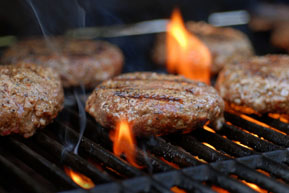Health Matters: Picnic Safety
Salmonella and other hazards of dining in the great outdoors

You may have noticed that at this summer’s barbecues it’s harder to find a once-ubiquitous ingredient: tomatoes. That’s because tomatoes have been identified as the source of a recent salmonella outbreak — a scary reminder of how easy it is to get food poisoning.
The Centers for Disease Control and Prevention (CDC) estimates that every year over 40,000 people are infected with salmonella, which causes fever, diarrhea, and abdominal cramps, starting 12 to 72 hours after ingesting. Most people recover in a few days, but some don’t. Infants, the elderly, and people with impaired immune systems are more likely than others to become severely ill.
“The Food and Drug Administration (FDA) is currently working to identify the source of this most recent salmonella poisoning,” says Joan Salge-Blake, a Sargent College clinical assistant professor of health sciences. In the meantime, the FDA is advising people to eat only the tomatoes not associated with the outbreak. Safe tomatoes are cherry tomatoes, grape tomatoes, tomatoes sold with the vine still attached, and tomatoes grown in backyard gardens.
As with most types of food poisoning, salmonella victims usually can’t tell they’ve become infected until they’re sick. Salge-Blake reminds us that outdoor cooking increases the chance of food poisoning, because people don’t take the same precautions with food preparation and cleanliness as they would be in their own kitchens. She offers the following tips for safe summer dining:
– Remember that cleanliness is the most important factor when cooking. Wash hands with hot, soapy water. If water and soap aren’t available (when dining outside, for example), remember to bring hand sanitizer.
– Be especially careful when handling raw food. Wash hands before and after touching any raw meat or fish and be sure not to mix raw food and cooked food.
– Wash all produce and refrigerate.
– Eating food outside when it’s warm puts food in a “danger zone,” because bacteria multiply in warm temperatures,. Do not have food in direct sunlight. Leaving food out while you go play Frisbee and then putting it in the fridge a few hours later is not safe.
– Always remember to clean, separate, cook, and chill. When in doubt, throw it out.
Finally, Salge-Blake suggests that picnickers bring food that doesn’t have to be refrigerated. She recommends such things as peanut butter sandwiches, nuts, whole pieces of fruit (once the fruit is cut, it needs to be refrigerated), cookies, and crackers.
Amy Laskowski can be reached at amlaskow@bu.edu.

Comments & Discussion
Boston University moderates comments to facilitate an informed, substantive, civil conversation. Abusive, profane, self-promotional, misleading, incoherent or off-topic comments will be rejected. Moderators are staffed during regular business hours (EST) and can only accept comments written in English. Statistics or facts must include a citation or a link to the citation.